|
|
|
Sort Order |
|
|
|
Items / Page
|
|
|
|
|
|
|
| Srl | Item |
| 1 |
ID:
077273
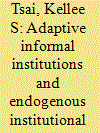

|
|
|
| 2 |
ID:
080213
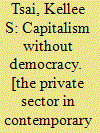

|
|
|
|
|
| Publication |
Ithica, Cornell University Press, 2007.
|
| Description |
xviii, 268p.
|
| Standard Number |
9780801473265
|
|
|
|
|
|
|
|
|
|
|
|
Copies: C:1/I:0,R:0,Q:0
Circulation
| Accession# | Call# | Current Location | Status | Policy | Location |
| 053042 | 338.610951/TSA 053042 | Main | On Shelf | General | |
|
|
|
|
| 3 |
ID:
169792
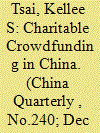

|
|
|
|
|
| Summary/Abstract |
Social media in China has not only become a popular means of communication, but also expanded the interaction between the government and online citizens. Why have some charitable crowdfunding campaigns had agenda-setting influence on public policy, while others have had limited or no impact? Based on an original database of 188 charitable crowdfunding projects currently active on Sina Weibo, we observe that over 80 per cent of long-term campaigns do not have explicit policy aspirations. Among those pursuing policy objectives, however, nearly two-thirds have had either agenda-setting influence or contributed to policy change. Such campaigns complement, rather than challenge existing government priorities. Based on field interviews (listed in Appendix A), case studies of four micro-charities – Free Lunch for Children, Love Save Pneumoconiosis, Support Relief of Rare Diseases, and Water Safety Program of China – are presented to highlight factors that contributed to their variation in public outcomes at the national level. The study suggests that charitable crowdfunding may be viewed as an “input institution” in the context of responsive authoritarianism in China, albeit within closely monitored parameters.
|
|
|
|
|
|
|
|
|
|
|
|
|
|
|
|
| 4 |
ID:
108231
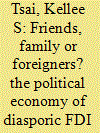

|
|
|
|
|
| Publication |
2010.
|
| Summary/Abstract |
Focusing exclusively on foreign direct investment (FDI) as a comparative measure of capital inflows obscures another significant source of funds-that of monetary remittances. This article emphasizes the empirical and analytic value of disaggregating FDI data and analyzing remittance trends in the two most populous developing countries in the world, China and India. While identifying the determinants of FDI inflows dominates much of the literature on FDI, this article suggests that the concept of FDI may not be the most meaningful indicator of relative developmental performance, especially given the reality of national definitional differences in FDI, roundtrip capital, growth in portfolio investment and variation in the sources and uses of realized FDI. In this context, the article examines what motivates the respective diasporas to send money back to their homelands in the form of FDI versus remittances and the local developmental implications of these diasporic flows. It proposes that attending to vernacular modes of capital formation such as ethnic and transnational networks presents an analytic opportunity to generate more empirically accurate and nuanced theories of political economy.
|
|
|
|
|
|
|
|
|
|
|
|
|
|
|
|
| 5 |
ID:
067537
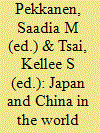

|
|
|
|
|
| Publication |
London, Routledge, 2005.
|
| Description |
xxi, 245p.
|
| Series |
Politics in Asia series
|
| Standard Number |
0415369010
|
|
|
|
|
|
|
|
|
|
|
|
Copies: C:1/I:0,R:0,Q:0
Circulation
| Accession# | Call# | Current Location | Status | Policy | Location |
| 050559 | 330.952/VOG 050559 | Main | On Shelf | General | |
|
|
|
|
| 6 |
ID:
180072
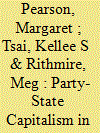

|
|
|
|
|
| Summary/Abstract |
China’s economic model, commonly described as “state capitalist,” is now better characterized as party-state capitalism, in which the political survival of the Communist Party trumps developmental goals. Its tools for managing the economy include not only state ownership and market interventions, but increasing use of party-state power to discipline private capital. China’s entrepreneurs are now expected to adhere to the party line, as are foreign corporations operating in the country. The shift is fueling a backlash from foreign governments that view the fusion of state and private interests in China as a threat to their own national security.
|
|
|
|
|
|
|
|
|
|
|
|
|
|
|
|
| 7 |
ID:
183232
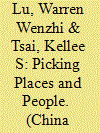

|
|
|
|
|
| Summary/Abstract |
China's political system has been characterized by two institutions since the 1980s: an explicit “layer-by-layer administrative hierarchy” and the “appointment of cadres one level down.” There have, however, been two departures from these administrative practices. First, some provinces have “empowered prosperous counties” by placing them in a dual-reporting relationship with both prefecture-level cities and provinces. Second, some provinces have restored personnel control going “two levels down” by appointing key officials at the county and urban district levels of government. These deviations evolved as responses to China's GDP-centric policy environment during the early reform era. Based on field interviews and nationwide analysis of city-level personnel data, this article argues that such adaptations have generated unintended conflicts between provinces and prefecture-level cities. While prior studies of evolutionary change in China highlight the relationship between state and non-state actors, this study demonstrates how interactions among state actors themselves may fundamentally transform the dynamics of administrative governance.
|
|
|
|
|
|
|
|
|
|
|
|
|
|
|
|
| 8 |
ID:
138152
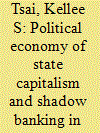

|
|
|
|
|
| Summary/Abstract |
The Xi-Li administration faces the dual challenge of managing state capitalism and shadow banking as China enters a phase of more moderate economic growth. During China’s first three decades of reform, private sector development occurred in parallel with prioritization of state-owned enterprises in strategic industries, and growth surged. This pattern of state capitalism rested on an unarticulated bifurcated financing arrangement whereby the formal banking system primarily served public enterprises, while private businesses relied primarily on informal finance. However, China’s response to global financial crisis disrupted the preceding equilibrium of financial dualism under state capitalism. Unprecedented expansion of bank lending after 2008 created opportunities for a host of state economic actors—including SOEs, state banks, and local governments—to expand their participation in off-balance sheet activities.
|
|
|
|
|
|
|
|
|
|
|
|
|
|
|
|
| 9 |
ID:
186059
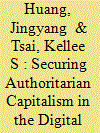

|
|
|
|
|
| Summary/Abstract |
To develop a robust surveillance apparatus in the digital age, autocracies are compelled to rely on foreign suppliers or to allow domestic private entrepreneurs to enter a strategic industrial sector. The process through which China developed a surveillance state led by globally competitive security companies exemplifies this authoritarian capitalist dynamic. Initial liberalization enabled domestic firms to adapt foreign technology and eventually introduce innovations in digital surveillance. By the late 2000s, China had developed a vibrant and segmented security industry: homegrown surveillance giants with the most advanced technology dominated public procurement contracts and export markets, while smaller and medium-size enterprises were creating intrusive monitoring applications that go well beyond what the state had originally envisioned. Because China’s surveillance state rests on strong public-private linkages, the assumed alliance between surveillance capitalists and a despotic state has generated external backlash from liberal democratic countries. Global supply chains involving sensitive technology have remained resilient, however.
|
|
|
|
|
|
|
|
|
|
|
|
|
|
|
|
|
|
|
|
|